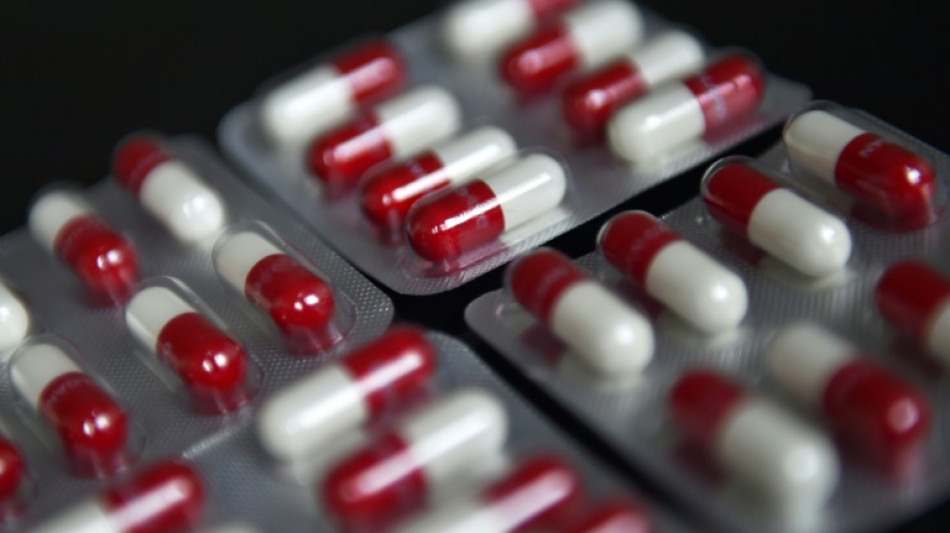
SCS
0.0200


It can start during the most commonplace of incidents, such as slipping in the bathroom or injuring a shoulder playing baseball.
But once an infection with bacteria that has become resistant to common antibiotics sets in, it can be extremely difficult to diagnose -- and even harder to treat.
Antimicrobial resistance (AMR) is one of the world's biggest infectious killers, accounting for more deaths than HIV/AIDS or malaria in 2019.
And these superbugs are becoming more resistant. Recent research estimating that 39 million people will die from AMR over the next quarter century.
This often under-discussed health crisis will be the subject of a high-level meeting on the sidelines of UN talks in New York on Thursday.
Ahead of the meeting, three AMR survivors told AFP about their experience.
- 'We are all vulnerable' -
In October 2020, veterinarian John Kariuki Muhia slipped in the bathroom of his home in Kenya's capital Nairobi and broke his hip.
It required open surgery to put pins in his hip joint.
"Immediately afterwards, I became very, very ill," he said.
He was given a range of antibiotics, but none helped. Neither did more surgery to remove the pins.
His doctors feared they would lose him. Then he got Covid.
"I was fighting for my life," he said.
After five months in hospital, he was sent home but remained bedridden.
Kariuki Muhia said he was "lucky" to have studied AMR, so he suspected it could be what was afflicting him.
So he had an antimicrobial susceptibility test, which tried out 18 different antibiotics on his infection.
One worked and by November 2021 he was considered recovered.
But he is now "a permanently disabled person," having lost nearly eight centimetres (three inches) from the length of his right leg.
Kariuki Muhia, who will address the UN meeting on Thursday, emphasised that "we are all vulnerable" to AMR.
"Something has to be done."
- A seemingly 'boring' injury -
While throwing a baseball around as a teenager in the early 2000s, Anthony Darcovich tore the rotator cuff in his right shoulder.
It was a relatively "boring" injury in the eyes of the doctors, the now New York-based 34-year-old said.
He had a series of surgeries aiming to fix his shoulder and stop the pain. None worked.
Before undergoing each operation, he was given standard antibiotics to avoid infection.
After the seventh surgery in the mid-2010s, doctors discovered an infection in his shoulder that was resistant to antibiotics.
"Unknowingly, each surgery was spreading the infection further," he said.
From there, Darcovich underwent 12 more surgeries to remove the "infected hardware" in his shoulder, such as anchors, screws and a cartilage transplant.
His joint was "completely destroyed" and he needed a total shoulder replacement.
"It's something that I'll be recovering from for a long time," he said.
"The end goal would be that I'm able to lift my arm to shoulder height."
Darcovich is different to many other AMR cases, because the bacteria that infected his shoulder is normally benign -- in fact, it usually causes acne.
But because the bacteria was antibiotic-resistant, once it was in his shoulder joint it spread and caused damage.
"Everyone will get some sort of infection over the course of their life," said Darcovich, who is now an AMR patient advocate.
"We've lived in a world where more often than not, we're able to treat many of those infections quite effectively... but in the context of resistance, that assumption no longer holds."
- 'Completely shattered'
Bhakti Chavan had just finished her studies in the Indian city of Mumbai in 2017 when she noticed swelling on the side of her neck.
Her doctor prescribed antibiotics, but the swelling did not go down, said the 30-year-old clinical researcher.
After some testing, she was diagnosed with drug-resistant tuberculosis, a common and dangerous form of AMR.
"I was completely shattered," Chavan said.
First and second-line drugs did not work, but Doctors Without Borders gave her access to two new drugs.
She suffered from depression as she endured the often harsh side effects.
She also feared telling anyone because of the "stigma" around tuberculosis, though she was not infectious.
After two years of treatment involving eight different antibiotics -- including "daily painful injections for eight months" -- she is now in good health.
Still, she fears that too few people -- including some doctors -- are unaware of the threat posed by AMR.
"It can happen to anybody," she said.
I.Taylor--ThChM--ThChM